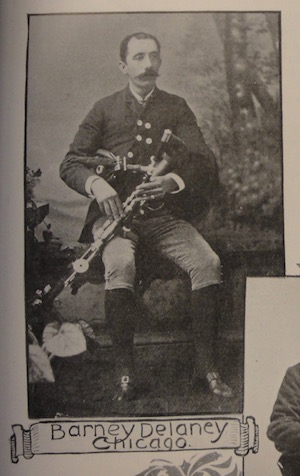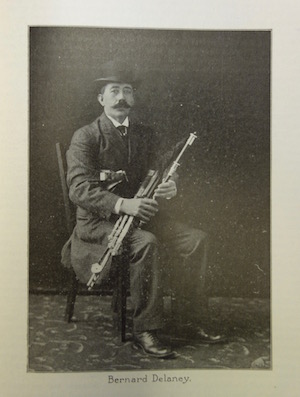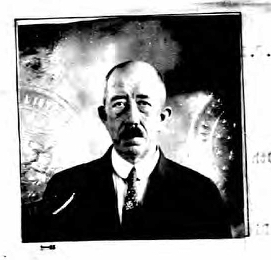Barney Delaney
performer; private recordings exist
b. Killeigh, Tullamore, Co. Offaly, Ireland baptized May 25, 1854
d. Norwood Park, Cook Co., Illinois July 20, 1923

Taken from The Gael. (An Gaodal.) New Series vol. 21, no. 2 Feb. 1902, p. 35

Taken from O'Neill, Francis Irish Minstrels and Musicians Chicago 1913 p. 311

Passport photo, submitted with US passport application at New Orleans, Oct. 1919.
Delaney is in the photo of the "Irish Music Club, Chicago" probably taken before 1902.
Most of what is known about Bernard Delaney is from the writing of Francis O'Neill. To O'Neill, Delaney was among the best of all pipers and unequalled when playing for dancers. Delaney was also a troublesome in-law, ungrateful, and as the years went by, increasingly annoying.
Delaney was born 1854 in the Parish of Killeigh near the town of Tullamore, Co. Offaly (in earlier days called Kings County). He was the son of Patrick and Eliza Dinn Delaney. O'Neill says he took to music early, became a good whistle player. After some initial instruction by John Foraghan, a local piper, Delaney was largely self taught on the pipes.
Recent research by Michael Kelly shows that Delaney married Mary Farrell of Tullamore in 1874. They had five children, four of whom died in childhood. Mary died of measles, pneumonia and heart disease, age 30. As Kelly writes, "it's clear that he took the emigrant ship shortly after the death of his wife in 1882."
US Census records and a later application for a US passport indicate that he emigrated to the United States in 1882. He spent a couple years in Philadelphia, working as a laborer for the Baldwin Locomotive Works. He "saved the price of a small set of pipes made for him specially by 'Billy' Taylor, the great pipemaker of that city."
Delaney moved to Chicago and was there seeking musical engagements by Feb. 1885. He immediately attracted the attention of O'Neill and other Chicago Irish musicians. In his book Irish Folk Music O'Neill describes hearing him for the first time. Delaney was playing in a saloon on Van Buren Street. O'Neill heard him playing before he entered the building and even then judged him to be a piper of remarkable talent. O'Neill later described him as "unquestionably the best player of Irish dance music now alive, perfect time, fine spirit, great execution...." Perhaps because of O'Neill's interest, Delaney "soon had a pleasant engagement, and was accessible to all who desired to enjoy his music and learn his tunes."
At first he was generous with tunes. One tune which he introduced to Chicago was "My Former Wife." O'Neill writes "The sudden popularity which it achieved became a source of no little embarrassment to its sponsor. It was one of the 'pet' jigs which he liked to play at public entertainments. When [piper James] Early and [fiddler John] McFadden happened to be on the same programme and came on the stage ahead of Delaney, the mischievous pair never failed to play his favorite tune."
O'Neill drew on Delaney's repertoire and memory when compiling his books of music. He is credited as the source of nineteen tunes or tune versions in O'Neill's Music of Ireland: Eighteen Hundred and Fifty Melodies, the mammoth collection published in 1903. Among them "Tell Her I Am" (no. 749), "Jackson's Morning Brush" (no. 899), "My Love is in America" (no. 1327), "The Dublin Reel" (no. 1374), and "Rakish Paddy" (no. 1533). Interestingly, "My Former Wife" (no. 849) is credited to "Earley."
By 1913 O'Neill describes Delaney as "a miser with his tunes," and unwilling "to teach his art to old or young."
But to return to Delaney's early days in Chicago. By 1886 his reputation as a musician was well established. Bernard Delaney married Julia Rogers Sep. 26, 1886. She was a younger sister of Francis O'Neill's wife Anna Rogers. Elizabeth, the surviving daughter by his first marriage, born 1880, joined Delaney and his second wife in Chicago in 1887.
When the touring play "The Ivy Leaf" came through Chicago, probably in December 1885, Eddie Joyce, the play's piper, took sick. Delaney took over, and did so well that the play's management asked him to continue. Other touring company jobs followed. To forestall these out of town engagements, O'Neill says he went to New York City and offered Delaney a job as Chicago Policeman. Delaney accepted, and became a member of the police force, probably about 1887. O'Neill writes that Delaney was working for the Department of Police in 1887, but his employment record states that the date of registered employment was February 13, 1889.
Starting in 1888 he begins to be mentioned in newspapers, playing at engagements of various kinds. Receptions, concerts, memorials. Many were at Irish nationalist events; for example, he appeared at programs honoring the memory of Robert Emmet for several years running. Most of these gigs were in Chicago, but he is occasionally mentioned in other locations in the north-central part of the country, Cincinnati and Cleveland, Ohio; Indianapolis, Indiana, etc. In 1903 Delaney was active in the Irish Music Club of Chicago, and elected its Vice President. The club had in its membership the "best known players of Irish music." After that year, though, he is not mentioned in club activites. The last newspaper mention of a public performance I could find is from March 1910, at a St. Patrick's Day celebration of the Catholic Order of Foresters in Hammond, Indiana.
Delaney played pipes on cylinder recordings and about four of these survive. At least two were probably made in 1904 or before, and were for a time owned by O'Neill.
Delaney retired from the police force in March 1912. O'Neill says he was a good businessman and had "grown wealthy for a piper or policeman." But O'Neill resented what he saw as ingratitude. By 1912 he was willing to write in private: "As an honourable man or one having a germ of gratitude or appreciation of picking him off the street or tavern and making him what he is, he is intolerable." O'Neill makes clear that Delaney was no longer willing to make piping recordings for him, and later implies that he also refused to share tunes with him, "Yet in the manner of enlarging his own repertoire no one was more acquisitive."
Despite this annoyance, one can see a measure of objectivity in O'Neill's description of man and music. From his book Irish Minstrels and Musicians, 1913: "Unconcerned and self-possessed under all circumstances in public or private, he plays on undisturbed by an excited partner, who forgets when to change or repeat; and to crown all, his instrument is sure to be in perfect tune, for in the mechanical art of putting or keeping an instrument in repair he has nothing to learn. ... The simplest tune at his hands took on a new expression and became a marvel of melody, so instinctive was his fancy and finished his execution."
Delaney retired as policeman in 1912 and moved to Ocean Springs, Mississippi, "900 miles away on the Gulf of Mexico." In a letter of March 9, 1912, O'Neill complains about Delaney "planting himself and his wife on my hospitality for a few days before his departure." Francis O'Neill bought property in Ocean Springs in 1914 and he and his family wintered there from 1914 until his death in 1936. Julia Rogers Delaney died June 22, 1915 at Ocean Springs.
Next to nothing is heard about Delaney after he retired. He may have stopped playing music.
In October 1919, still a permanent resident of Ocean Springs, Delaney applied for a US passport. He intended to go to Cuba "For Health." Apart from an Illinois State death notice in 1923, the last contemporary reference to Delaney is found in a letter from O'Neill to Henry Mercer, Oct. 15, 1920. Of the surviving top-quality pipers he writes "Barney Delaney with his own fascinating style - the favorite of the dancers - is past 70 and an inmate of the Illinois State Hospital for the Insane - paresis - and that ends the good pipers."
My father John Whitmer, a retired physician who trained in the late 1940s, told me that in this context "paresis" means a late stage of syphilis, a dreadful medical condition, usually involving chronic suffering and mental derangement. It is likely that the Hospital for the Insane was where Delaney would have died. This was in the days before antibiotics, with which the disease can be effectively treated. The course of the disease is variable and for Delaney the process of disintegration may have taken weeks or years, even decades. In any case an awful strain on the family, and another possible source of O'Neill's resentment.
Delaney died July 20, 1923, place of death listed as Norwood Park, a neighborhood in Chicago. He is buried at Mount Olivet Catholic Cemetery, Chicago. The grave is unmarked.
A full biography of Bernard Delaney was published in 2024. Bernard 'Barney' Delaney (1854-1923) Offaly and Chicago Piper was written by Seamus Kelly. It contains most of what is known about his life and has new information about his years in Ireland and about his descendants.
Selected References
- Representative recordings:
"The Sailor's Jacket;" "Hawk's Hornpipe," c. 1901
https://archives.irishfest.com/dunn-family-collection/History/Musician-Biographies/Bernard-Delaney.htm
"Padraic Taylor's Reel (Beauty Spot)," c. 1901
http://pipers.ie/source/media/?galleryId=375&mediaId=9870
Carolan, Nicholas A Harvest Saved Ossian Publications, Cork 1997 footnote 141, p. 69
Ennis, John "Irish Music Club Annual Festival" ["best known players" as members] Chicago Citizen July 4, 1903 p. 6 column 3
Microfilm from the Abraham Lincoln Presidential Library, Springfield IL
General City Items. "-Bernard Delaney, the celebrated[?] Irish piper, has arrived[?] in Chicago, and is open to any engagement. He will amuse you with his Irish reel, jig, and clog. Address Bernard Delaney, 216[?] South Clark street."
Oak Park IL Cicero Vindicator Feb. 14, 1885 p. 2 column 1
Newspaperarchive.com
"Glengarriff" O'Neill's property in Ocean Springs. "Know Our Homes," Ocean Springs Archives by Ray L. Bellande.
http://oceanspringsarchives.net/know-our-homes
Graves, A. P. 'Francis O'Neill's "Music of Ireland." ' Journal of the Irish Folk Song Society vol. V 1907(?) pp. 31-36.
Hathi Trust
https://babel.hathitrust.org/cgi/pt?id=inu.30000108642194&view=1up&seq=255
"Irish Music Club Picnic." [Vice President of the Irish Music Club of Chicago] Chicago Citizen June 6, 1903 p. 7 column 4
Microfilm from the Abraham Lincoln Presidential Library, Springfield IL
Kelly, Michael "Bernard ('Barney') Delaney (c. 1852-1923), piper, Tullamore & Chicago: Supplementary biographical information, July 2022" unpublished 5 pp. [Delaney's first marriage]
Kelly, Seamus Bernard 'Barney' Delaney (1854-1923) Offaly and Chicago Piper ShayKelly Productions 2024 111 pp. [Delaney's baptism record; appointed as Chicago policeman Feb. 13, 1889]
Obituary Notes. "MRS. JULIA DELANEY...." ["sister of Mrs. Francis O'Neill"] Chicago [IL] Examiner June 24, 1915 p. 17 column 6
Chicago Public Library Digital Collections
https://cdm16818.contentdm.oclc.org/digital/collection/examiner/id/55027/rec/36
O'Neill, Francis Irish Folk Music Chicago 1910 pp. 30-32, 96
O'Neill, Francis Irish Minstrels and Musicians Chicago 1913 pp. 310-13, etc.
O'Neill, Francis O'Neill's Music of Ireland: Eighteen Hundred and Fifty Melodies Chicago 1903.
O'Neill, Francis Twilight [part 2, letter no. 3] Chicago, March 9th, 1912. An Píobaire vol. 1 no. 18 Bealtaine 1974 pp. 119-20
https://pipers.ie/source/media/?galleryId=1010&mediaId=25890
O'Neill, Francis Twilight [part 4, letter no. 5] Chicago. 1912. An Píobaire vol. 1 no. 20-21 Feabhra 1975 p. 127
https://pipers.ie/source/media/?galleryId=1010&mediaId=25892
O'Neill, Francis Letter to Henry Mercer Oct. 15, 1920 From the Collection of the Mercer Museum Library of the Bucks County Historical Society, Doylestown, Pennsylvania.
Nick Whitmer
July 2018 additions July, Oct. 2022, April 2023, June 2024